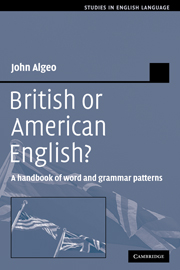Book contents
- Frontmatter
- Contents
- Preface
- Acknowledgments
- Introduction
- Part I Parts of Speech
- Part II Syntactic Constructions
- 11 Complementation
- 12 Mandative constructions
- 13 Expanded predicates
- 14 Concord
- 15 Propredicates
- 16 Tag questions
- 17 Miscellaneous
- Bibliography of British book citation sources
- Bibliography of studies, dictionaries, and corpora
- Index of words
- Frontmatter
- Contents
- Preface
- Acknowledgments
- Introduction
- Part I Parts of Speech
- Part II Syntactic Constructions
- 11 Complementation
- 12 Mandative constructions
- 13 Expanded predicates
- 14 Concord
- 15 Propredicates
- 16 Tag questions
- 17 Miscellaneous
- Bibliography of British book citation sources
- Bibliography of studies, dictionaries, and corpora
- Index of words
Summary
Hovering between grammar and lexis are constructions like have a look, which are approximately equivalent to a simple verb, such as look. The construction and its varieties have received several discussions, some primarily general (Allerton 2002, Brinton and Akimoto 1999, Claridge 1997, Wierzbicka 1982), some based on British corpora (Stein 1991, Stein and Quirk 1991), and others dealing also with British-American variation (Algeo 1995).
The verb in the expanded predicate may be relatively “light” (that is, general or nonliteral) in meaning with respect to its object (be a challenge, do a dance, get a view, give a yawn, have an argument, make one's way, pay attention, put an end to, take trouble), or it may be relatively “heavy” semantically, being appropriate to its object (ask a question, breathe a sigh, effect an alteration, find a solution, grant permission, heave a sigh, offer an apology, reach an agreement, submit an application, tender one's apologies, utter a curse).
The object noun in the construction may be “eventive,” that is, correspond to a verb of similar meaning, with or without some change of form from the verb (do a dive = dive, give an answer = answer, take a walk = walk, but also have a bath = bathe, and make a discovery = discover).
- Type
- Chapter
- Information
- British or American English?A Handbook of Word and Grammar Patterns, pp. 269 - 278Publisher: Cambridge University PressPrint publication year: 2006



